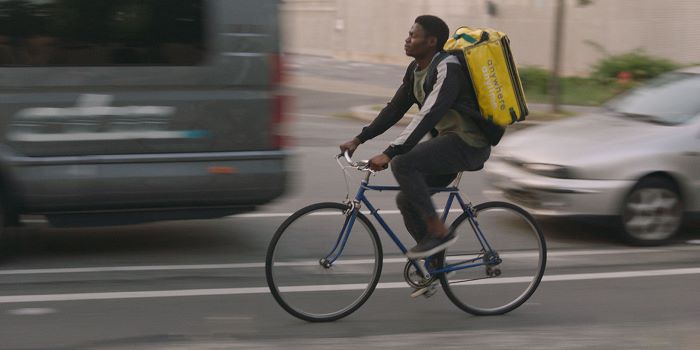The most gut-wrenching and violently visceral scene at the recent Toronto International Film Festival was in the Italian neo-neorealistic movie Anywhere Anytime. The moments in question involved a confrontation over a stolen and coveted commodity. Director Milad Tangshir’s feature debut, almost from the beginning, expands upon a certain Italian neorealism classic, Vittorio De Sica’s Bicycle Thieves.
Set 75 years after that postwar drama, Issa (Ibrahima Sambou), an undocumented Senegalese migrant in his 20s, has been living in Italy for six years and works at a farmers’ market in Turin, but not for long. His employer is afraid of being fined for hiring the paperless migrant, so the young man is let go. (It’s not the vendor’s over-anxious imagination: The police are on patrol.) On the advice of his fellow Senegalese, Mario (Moussa Dicko Diango), the broke Issa hesitantly joins the gig economy. Mario, who works as a cook at an Italian restaurant, goes so far as to lend Issa his bulky food delivery backpack, the money to buy a refurbished bike, and his own smartphone so Issa can use its apps, assuming that customers can’t distinguish one Black African from another.
Issa blends in with the roaming population of other gig workers, riding through both well-to-do and dicey neighborhoods. Just like the protagonist in De Sica’s movie, Issa’s livelihood depends entirely on the bike. He could be set to make a stable living and send some money to his mother back home, but the hard-knock life intervenes. Inevitably, viewers will become anxious midway through, wondering how Issa can safely secure his bike without a lock.
The tribute to De Sica’s acclaimed film is intentional, but the modern-day version has its own vibe and reality, only mirroring the original here and there. It’s set to an eclectic international soundtrack (clarinetist Yom’s “Killing a Gypsy”; Sexteto Boloña’s “Aurora en Peking”) that subtly adds to the growing tension. Unlike many features about migrants in Europe that emphasize the hazardous journey to Europe and their vulnerability (the glossy Io Capitano and the tragic Tori and Lokita, to an extent), Issa takes matters into his own hands. Here the film takes a turn and becomes more than what it initially may appear to be, a vérité slice of life.
Anywhere Anytime confirms that a small-scale, compact story (at 80 minutes) can pack a wallop. Besides honoring De Sica’s seminal film, Tangshir’s update delves into a moral quandary that is as straight-to-the-point, uncompromising, and probing as those other chroniclers of contemporary Europe, the Dardenne brothers.







Leave A Comment